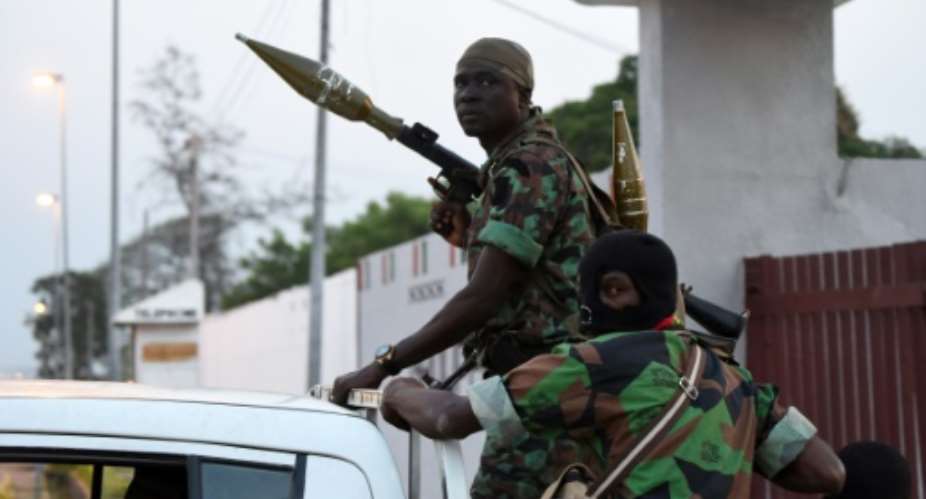Abidjan (AFP) - The Ivorian government on Wednesday pressed a bid to defuse a revolt by special forces, as fears of renewed unrest spread following weeks of protests over pay by security forces.
The authorities went into talks with protesters from the elite special forces -- the latest troops to mutiny in recent weeks -- while sharply condemning the soldiers who fired in the air in the army barracks town of Adiake.
The elite troops, who are in charge of the president's security, appeared to be angling for a deal with the government along the lines of one struck in January that offered some soldiers large one-off lump sum payments.
"The government ... condemns and deplores these violent forms of protest," Information Minister Bruno Nabagne Kone said, criticising "an attitude that has unfortunately been recurrent in recent weeks".
Earlier Wednesday, a resident of Adiake told AFP that elite troops based there were shooting in the air for the second consecutive day.
"Today, it's market day, and they (the troops) told the women to return to their houses. Everyone is terrified, and holed up in their homes," he told AFP by phone.
The shooting ceased in mid-afternoon, another resident said, but tension remained high, with elite troops manning the entrances to Adiake and barring entry to journalists.
Meanwhile a group of mutineers headed from Adiake to the commercial capital Abidjan, where they were due to meet Defence Minister Alain Richard Donwahi.
Asked why they had fired shots in the air, one said: "The authorities know what we want."
Tuesday's gunfire in Adiake, located to the east of the commercial capital Abidjan, was the first protest action by special forces since other soldiers and members of the security forces mutinied in January.
The government says two people have been injured in the latest wave of protests.
Adiake also is home to a maritime base that trains marine commandos and provides coastal surveillance in an area that shares a border with Ghana.
Political link?
Troops first launched a mutiny over pay on January 5.
Those protests subsided when the government reached a deal with 8,500 mutineers, agreeing to give them 12 million CFA francs (18,000 euros, $19,000) each.
However more soldiers have since taken to the streets demanding similar bonuses.
Last year Ivory Coast approved an ambitious military budget to modernise the army and buy new equipment.
But the 1.2-billion-euro pot would be insufficient to offer similar payments to all of the country's 23,000-strong security forces.
The mutiny led to President Alassane Ouattara ordering major changes in top security ranks -- the armed forces' chief of staff, the senior commander of the national gendarmerie and the director-general of the police.
 Parliament speaker Guillaume Soro speaks as President Alassane Ouattara looks on
Parliament speaker Guillaume Soro speaks as President Alassane Ouattara looks on
The revolt came as a constitutional reform saw former prime minister Daniel Kablan Duncan sworn in as vice president -- with some analysts saying he could well be placed to step into Ouattara's shoes in future.
But some analysts wonder whether another former premier, ex-rebel leader Guillaume Soro, may have harboured presidential ambitions of his own, seeing a possible link between the army mutiny and the reshuffle.
'Pandora's box'
Soro, who was elected parliament speaker in January, attended Kablan's swearing-in ceremony and has consistently backed Ivory Coast's constitutional reform.
"The situation is worrying because the army is still under the control of ex-rebel chiefs," said Ivorian analyst Jean Alabro.
Ouattara, he said, "opened a Pandora's box" by initially agreeing to the demands of the mutineers.
The International Monetary Fund said in December that Ivory Coast was on track towards becoming the continent's fastest-growing economy.
The mutinies, however, have raised fears the country might slip back into deadly unrest.
A rebellion in 2002 sliced the former French colony into a rebel-held north and government-controlled south, triggering years of unrest.





 Critics fear Togo reforms leave little room for change in election
Critics fear Togo reforms leave little room for change in election
 Flooding: Obey weather warnings – NADMO to general public
Flooding: Obey weather warnings – NADMO to general public
 Fire in NDC over boycott of Ejisu by-election
Fire in NDC over boycott of Ejisu by-election
 NDC to outdoor Prof Jane Naana Opoku-Agyemang as running mate today
NDC to outdoor Prof Jane Naana Opoku-Agyemang as running mate today
 Ejisu: CPP seeks injunction to stop April 30 by-election
Ejisu: CPP seeks injunction to stop April 30 by-election
 Dismiss ECG, GWCL, GACL bosses over losses – United Voices for Change tells gov’...
Dismiss ECG, GWCL, GACL bosses over losses – United Voices for Change tells gov’...
 Submit 2023 audited financial statements by May – Akufo-Addo order SOEs
Submit 2023 audited financial statements by May – Akufo-Addo order SOEs
 Current power outages purely due to mismanagement – Minority
Current power outages purely due to mismanagement – Minority
 ECG hoists red flag to fight Ashanti Regional Minister over arrest of General Ma...
ECG hoists red flag to fight Ashanti Regional Minister over arrest of General Ma...
 Mahama’s 24hr economy will help stabilise the cedi; it’s the best sellable polic...
Mahama’s 24hr economy will help stabilise the cedi; it’s the best sellable polic...
